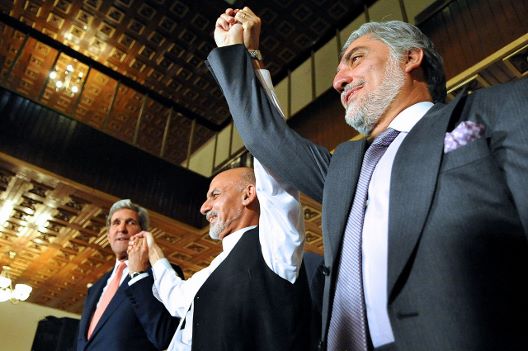
President Ashraf Ghani took over from President Hamid Karzai in Kabul today in an historic transition. A long dispute over the election result was resolved with a rare compromise that brought Dr. Ghani’s opponent, Dr. Abdullah Abdullah, into government in a new position, as “chief executive,” that is shaped as a kind of prime ministership. The flood of commentary that preceded this inauguration was marked by extreme views, divided between those who saw the Afghan glass as half full and those who saw it emptying fast.
The mission for President Ghani will be to ensure that the glass remains unbroken. For Afghanistan’s sake and for the sake of its global and regional partners, who have invested heavily in this democratic transition, it is critical that Ghani leads in set up a governance system that works, is corruption-free, and lays the ground for stability and prosperity. He faces the task of doing so in the face of a Taliban insurgency that contests, or has displaced, state authority in disparate swaths of the country.
Ghani’s first challenge will be to ensure that government ministries are not treated as spoils for the winners. He will have to create, with Abdullah’s cooperation, a self-monitoring mechanism that will deter malfeasance and ethnic or tribal favoritism in sharing out the Afghan state’s own and borrowed or gifted resources.
The new president then will need to rebuild the confidence of his global partners by renewing ties that Karzai left to wither in the past year or two. Signing the Bilateral Security Agreement with the United States likely will be on top of that list of promises he made. That will let a small US troop contingent stay in the country to train Afghan forces after the NATO-led combat force ends its mission within three months.
Ghani has the knowledge and experience of regional economics and politics that will let him revivify ties with Iran, Central Asia, Pakistan, and India. Rather than use India as a foil for Pakistan, he should work to catalyze an India-Pakistan partnership that would create a regional energy and open trade market with Afghanistan as a hub. He also could use Afghanistan’s deep cultural ties with Iran to help that country work out differences with the United States and Europe, and also resolve bilateral issues of drug smuggling and water-sharing across the Afghan-Iranian border.
His challenges abound, both at home and abroad. Besides the war, corruption and the illegal narcotics trade are pervasive, undermining the weak government machinery upon which Ghani will rely. Amid all this, Afghanistan has a largely young and heavily urbanized population that will need help in maintaining the progress that Afghan society has made in the past decade or so. Education, and especially of girls, has been a major achievement. Participation of women in the work force has grown. Health care has improved.
If Ghani can retain the progress made by persuading others to follow his personal example, and if he and Dr. Abdullah act visibly in concert to fight corruption and narcotics, they will be able to set Afghanistan on the right path. A path that Afghanistan’s friends would be better able and willing to support.
Shuja Nawaz is director of the South Asia Center at the Atlantic Council.
